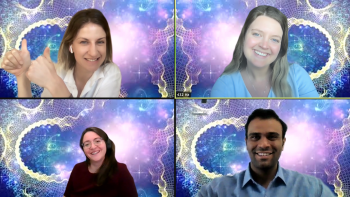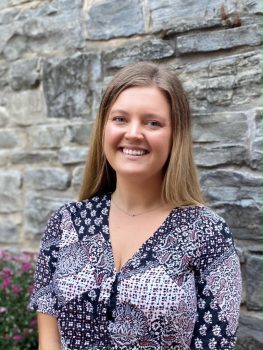
If you have read previous case competition reflections on this blog, you will know that competing is no small task. As a member of the Beedie School of Business’ Net Impact Case Competition team, I felt the same sense of challenge, camaraderie, and accomplishment that past teams have recounted. Satyajeet Chouhan (FT MBA), Eleanor Kroeger (MOT), Carla Giles (EMBA), and I (FT MBA) shared many laughs, late nights, and “aha” moments throughout our competition preparation, and came out of it with new friends and connections that will last well beyond the conclusion of the competition. We were lucky enough to leave the competition with all of this, and something else; an enhanced understanding of and passion for tackling climate justice.
Our challenge for the Net Impact Case Competition was to help Canadian telecommunications company TELUS further its already robust climate justice strategy. Earth’s climate is changing at some of the fastest rates in human history; our ozone is depleting, sea levels are rising, and extreme weather events are becoming more frequent. We have all heard about the urgency of this issue, and the need to take extreme and immediate action to counteract the human race’s impact on the environment. We often talk about alternative forms of transportation, adjustments to our diets, and reducing energy consumption and waste when searching for climate solutions. This, however, is only part of the battle.
Climate justice takes necessary action a step further, and recognizes that we must collectively elevate our most vulnerable people and create safe living conditions for all in order to fully tackle the climate crisis. As Hop Hopkins says in his article for Sierra Club, “We will never survive the climate crisis without ending white supremacy. Here’s why: You can’t have climate change without sacrifice zones, and you can’t have sacrifice zones without disposable people, and you can’t have disposable people without racism”. Black and Indigenous People of Colour (BIPOC) disproportionately suffer the impacts; whether through direct pollution, heat stress, loss of traditional land and ways of life, or extreme weather events, among others. In many cases, the communities facing these undeniable impacts are among the least responsible for them but are treated as disposable as big corporations continue to exploit the environment for monetary gain. In order for a climate strategy to be just, we must share the burdens and benefits of climate change and justice equitably.
In BUS 716: Sustainability, our instructor, Susan Doig, emphasized Kate Raworth’s idea of a doughnut economy. The idea of this model is that we need to find a way of living that utilizes enough resources to form a solid social foundation, while at the same time staying within the planetary boundaries climate scientists have identified. A social foundation means that we are distributing resources such that everyone has access to food, clean water, healthcare, and education, and that we live in a world of gender and social equity where everyone has a voice. The planetary boundaries include limits on ozone depletion, biodiversity loss, climate change, and six more environmental measures that are necessary for ecosystem resilience.
Individuals can have a large impact through lobbying, independent action, and purchasing power, but even more important is the impact that businesses can have. As of 2017, 100 companies accounted for 71% of greenhouse gas emissions. Though this figure only includes the largest 100, all businesses from large corporations to small, independent start-ups must strive for climate justice to ensure the longevity of the planet. Certifications like BCorp can help guide businesses toward sustainable, equitable practices throughout their entire supply chains and operations. Future generations depend upon today’s business leaders to not just prioritize profit, but work actively to achieve climate justice through eliminating white supremacy and tackling climate change.
Immersing yourself in researching our current global climate crisis can be overwhelming as there are many catastrophic figures and stark outlooks; however, I feel very lucky to have had such an enthusiastic and innovative team of colleagues to explore these issues with, and to be in a program that prioritizes diversity, action, research, and engagement with purpose. The outlook may seem bleak at times, but I am encouraged by the passion and creativity I see in my colleagues, in future generations, and in companies like TELUS that are well-positioned to make monumental differences in the fight for climate justice.
……………………………………………………………………………………………………………………………….
About the Author

Emma is a member of the full-time MBA program at the Beedie School of Business, is currently the captain of the Net Impact Case Competition Team, and is a Student Ambassador. With a background in outdoor education and the non-profit sector, she has a passion for bringing people together, spending time outdoors, and leadership. In her downtime, you can find her reading a book, watching hockey, or playing with her dog.